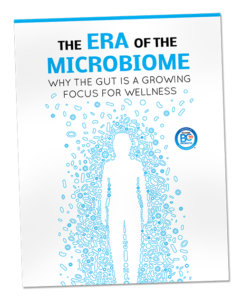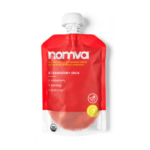Formulating Products Consumers Want with Research Supported Probiotic Ingredients

In today’s world, probiotics are becoming a mainstream part of everyday health. Kerry’s 2019 global study , a survey of over 11,000 health-conscious consumers in 14 countries, conducted before the pandemic, indicated that nearly three-quarters of consumers surveyed are familiar with the term probiotic and associate it with good health.[1] One characteristic that applies across all consumer groups is a hunger for food and beverage products formulated with ingredients supported by research, and there’s evidence that this has increased as a result of the current pandemic.
Since the pandemic, half (50%) of global consumers say they now want more information about health in general, while 49% want more information about the nutritional benefits of products. Nearly two thirds (64%) say they will now pay more attention to nutritional benefit claims.[2] Consumers’ growing appetites for additional foods and beverages with research supported benefits creates new opportunities for manufacturers to formulate with probiotic ingredients to offer the health benefits consumers want most.
Consumers’ Demand for Probiotics Driven by Research
The typical probiotic consumer is anyone with a focus on health, a broad group that includes both older adults – who are more likely to experience digestive health issues – and millennials and Gen Z, who are increasingly likely to take a proactive approach to wellness. For consumers worldwide, research substantiating claims is essential when choosing a digestive health product.
One group especially attuned to the research supporting probiotic benefits is parents of young children, who are particularly likely to choose products with digestive health benefits. Our consumer survey found that 42% of mothers with children under the age of 12 would be more interested in purchasing a fruit or vegetable juice if it offered digestive health benefits, compared to 38% of consumers overall.[3] Similarly, 53% of mothers with young kids would be more interested in purchasing a yogurt with digestive health benefits, compared to 48% of consumers overall.[4] Among parents with young children, part of the reason for this is likely the growing body of scientific research on the benefits of probiotics for kids.
For example, a study published last year in the journal, Food Research International, found that BC30™ (Bacillus coagulans GBI-30, 6086), a research-supported spore-forming probiotic ingredient, had a beneficial effect on digestion in school-aged children.[5]
Expanding Product Offerings
Consumer research also demonstrates demand for digestive health benefits across a range of categories. While the association between probiotics and products like yogurt clearly remains powerful–nearly half (48%)[6] the respondents said they would be interested in purchasing yogurts or yogurt-based drinks if they contained ingredients that promoted digestive health benefits, there is also strong demand for the benefits of probiotics in categories outside the refrigerated aisle. For example, nearly three in ten (28%)[7] consumers said they would be more interested in purchasing hot beverages if they contained ingredients promoting digestive health.
How to Choose a Probiotic Ingredient?
Clearly, ingredients backed by research are instrumental in creating products with strong claims support. Research from April, 2020 found that nearly half (49%) of global consumers say they want to hear more information on the benefits of products.[8] Around four in ten consumers worldwide are more likely to buy a healthy lifestyle product if they see claims based on research or scientific data, with as many as half in some regions saying they want to see a product’s benefits explained on the packaging.[9]
As with most products, the claims that can be made for them vary according to regional regulations. In in the U.S., for example, the following benefit statements may be appropriate:
Research has shown BC30 may:
- Support immune health (at 500 million CFUs per day)
- Support digestive health (at 1 billion CFUs per day)
- May support protein utilization (at 1 billion CFUs per day)
What is key is that when claims are made for products fortified with BC30, they’re backed by a scientific evidence. This gives manufacturers a valuable way to both differentiate and build trust. Brands that offer clear evidence for their claims are better placed to cut through the noise, and there are signs that this is particularly true in the current climate.
Differentiation with BC30™
Not all probiotics strains are the same. Different strains offer different benefits and some probiotic strains survive manufacturing processes, shelf life and digestive transit better than others. Brands can help consumers do their homework, first by using probiotic ingredients that are backed by high-quality studies, and second, by providing clear information about them on the label.
When choosing a probiotic ingredient consider the following:
- Is it safe and FDA Notified GRAS (Generally Regarded as Safe)?
- Does it survive the extremes of manufacturing?
- Does it survive the shelf life of the product?
- Will it survive digestive transit?
- Is there peer-reviewed published research to support it?
BC30, a spore-forming probiotic with a natural protective outer layer, can survive most processing conditions – including extremes of temperature, pH and pressure – as well as the journey to the gut. BC30 is supported by over 25 published studies confirming its stability and efficacy, and demonstrating a range of benefits for both digestive and immune health.
BC30 meets all of these criteria:
- The FDA issued a letter of no objection to BC30’s GRAS status. It’s the first Bacillus strain to receive this status.
- BC30 withstands high temperature processes, such as baking, boiling and microwaving, low temperature processes, such as freezing and refrigeration, and high pressure applications, such as extrusion, roll forming and HPP. In short, BC30 is the probiotic that can take it.
- BC30 has up to a three-year shelf life and has been tested in finished products hundreds of times.
- Its spore-forming nature allows BC30 to survive transit through the digestive system as it reaches its optimal environment – the gut – where it starts multiplying and proliferating.
- There are over 25 published papers to support the efficacy of BC30.
Because of its stability and support for its safety and efficacy, BC30 allows manufacturers to innovate with probiotics in a wide range of categories – everything from teas and coffees, to muffins, pizza and peanut butter, and beyond to offer the health benefits consumers want in a variety of everyday products.

Sources:
[1] Kerry Global Consumer Survey, Digestive & Immune Health, 2019
[2] Kerry Global Consumer Survey, Digestive & Immune Health, 2019
[3] Kerry Global Consumer Survey, Digestive & Immune Health, 2019
[4] Kerry Global Consumer Survey, Digestive & Immune Health, 2019
[5] Anaya-Loyola, M.A. et al. ‘Bacillus coagulans GBI-30, 6068 decreases upper respiratory and gastrointestinal tract symptoms in healthy Mexican scholar-aged children by modulating immune-related proteins’, Food Research International, Volume 125, November 2019.
[6] Kerry Global Consumer Survey – Digestive & Immune Health, 2019
[7] Kerry Global Consumer Survey – Digestive & Immune Health, 2019
[8] FMCG Gurus Evaluating the Uncertainty & Future Outlook of COVID-19 (April 2020)
[9] Kerry Global Consumer Survey – Digestive & Immune Health, 2019



